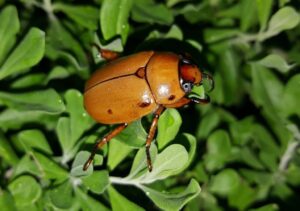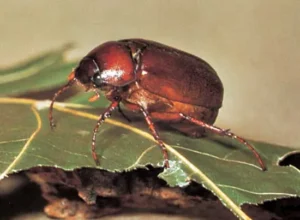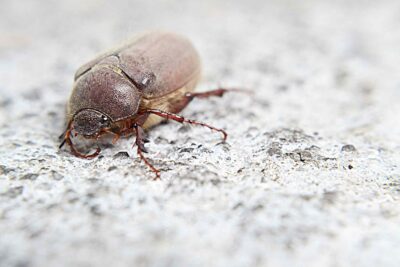When it comes to feeding your bearded dragon a varied diet, you might wonder about the suitability of different insects. Can bearded dragons eat june bugs? June bugs, also known as beetles, are a common insect found in many regions.
Understanding whether they can be a part of your bearded dragon’s diet involves looking into their nutritional value, potential benefits, and any risks associated with feeding them. In this guide, we’ll explore the considerations for including june bugs in your bearded dragon’s meal plan.
June bugs and their relevance in the diet of bearded dragons

June bugs, also known as June beetles, are not typically recommended as a regular part of a bearded dragon’s diet. While they are edible and provide some nutritional value, they also come with potential risks:
- Nutritional Value: June bugs are high in protein, which can be beneficial for bearded dragons. However, they do not offer a balanced range of nutrients necessary for overall health.
- Risk of Pesticides: June bugs might have been exposed to pesticides or other chemicals, which can be harmful to bearded dragons.
- Digestibility: They can be hard for bearded dragons to digest compared to other feeder insects like crickets, mealworms, or dubia roaches.
- Potential for Impaction: Their exoskeleton can be tough and might cause impaction if not properly broken down.
If you’re considering adding insects like June bugs to your bearded dragon’s diet, it’s best to consult with a reptile veterinarian to ensure they are safe and appropriate. Generally, sticking with more commonly recommended feeder insects will ensure a balanced and safe diet for your pet.
Can Bearded Dragons Eat June Bugs?
Bearded dragons can eat June bugs, but there are some important considerations:
- Safety: Ensure that the June bugs are from a safe, pesticide-free environment. Insects collected from outside or from unknown sources might be contaminated with harmful chemicals.
- Preparation: If you decide to feed June bugs to your bearded dragon, they should be properly prepared. This includes gut-loading them (feeding them nutritious food) and possibly dusting them with calcium or vitamin supplements.
- Digestibility: June bugs have a hard exoskeleton that can be tough for bearded dragons to digest. It’s essential to monitor your bearded dragon for any signs of digestive issues or impaction.
- Variety and Balance: June bugs should not be a staple food but can be offered occasionally as part of a varied diet. Regularly feeding them could lead to imbalances in nutrition.
- Size Appropriateness: Ensure the June bugs are appropriately sized for your bearded dragon. They should not be too large relative to the size of your pet to avoid choking hazards.
Consulting with a reptile veterinarian before introducing new foods is always a good idea to ensure your bearded dragon’s diet remains balanced and safe.
Potential issues with feeding June bugs
Feeding June bugs to be bearded dragons might seem like a fun, natural treat, but there are a few potential issues to be aware of:
- Pesticides and Chemicals: June bugs that have been exposed to pesticides or other chemicals can be harmful to bearded dragons. It’s important to make sure any bugs you feed them are free of harmful substances.
- Size and Digestibility: June bugs can be relatively large, and their tough exoskeleton might be hard for bearded dragons to digest. This could potentially lead to digestive issues or blockages.
- Nutritional Imbalance: While insects are a staple in a bearded dragon’s diet, relying too heavily on one type of bug might not provide the necessary balance of nutrients. Bearded dragons need a varied diet to ensure they get all the vitamins and minerals they need.
- Allergic Reactions: Some bearded dragons might have sensitivities or allergies to certain types of insects. It’s a good idea to monitor your dragon for any adverse reactions when introducing new foods.
Overall, it’s best to offer a variety of insects and ensure they’re sourced from reputable suppliers to avoid these issues. Always check with a vet if you’re unsure about the safety of a particular food.
How often June bugs should be fed

June bugs shouldn’t be a primary food source for bearded dragons. They can be fed occasionally, but here are some guidelines for how often:
- Frequency: Consider offering June bugs as an occasional treat rather than a regular part of their diet. A good rule of thumb might be once or twice a month, depending on your bearded dragon’s overall diet and health.
- Variety: It’s important to provide a varied diet for your bearded dragon. Including different types of insects (like crickets, dubia roaches, and mealworms) ensures they get a balanced intake of nutrients.
- Monitor Health: Watch your bearded dragon for any signs of digestive issues or adverse reactions when you introduce June bugs or any new food. Adjust their diet as needed based on their response and overall health.
As always, maintaining a varied diet and consulting with a reptile vet can help ensure your bearded dragon stays healthy and happy.
Best Practices for Feeding bearded dragons june bugs
Feeding June bugs to bearded dragons can be a fun way to diversify their diet, but it’s important to do so carefully to ensure their health and well-being. Here are some best practices:
- Source Quality Bugs: Ensure that the June bugs are sourced from a reliable and safe supplier. Bugs should be free from pesticides and other chemicals.
- Size Matters: Choose appropriately sized June bugs for your bearded dragon. The bugs should be small enough that they don’t pose a risk of choking or digestive blockage. If the June bugs are large, consider cutting them into smaller pieces.
- Occasional Treat: Feed June bugs as an occasional treat rather than a staple food. Too many can lead to nutritional imbalances or digestive issues. Aim for once or twice a month, along with a varied diet.
- Gut-Loading and Dusting: Gut-load the June bugs by feeding them nutritious foods before offering them to your bearded dragon. Dust the bugs with a calcium supplement to help ensure your dragon gets the necessary nutrients.
- Watch for Reactions: Monitor your bearded dragon for any signs of adverse reactions, such as changes in behavior, appetite, or digestion. If you notice any issues, discontinue feeding June bugs and consult a vet.
- Maintain Hygiene: Ensure that any insects fed to your bearded dragon are clean and free from contaminants. Avoid feeding bugs that might be carrying diseases or parasites.
- Provide Water: Always provide fresh water for your bearded dragon. Proper hydration is essential, especially when feeding insects.
By following these best practices, you can help ensure that feeding June bugs remains a healthy and enjoyable part of your bearded dragon’s diet.
Frequently asked questions
- Can bearded dragons eat June bugs? Yes, bearded dragons can eat June bugs, but they should be offered as an occasional treat rather than a regular part of their diet.
- Are June bugs safe for bearded dragons? June bugs are generally safe if sourced from a reputable supplier and fed in moderation. Ensure they are free from pesticides and chemicals.
- How often can I feed June bugs to my bearded dragon? June bugs should be fed occasionally, about once or twice a month, to ensure a balanced diet and avoid nutritional imbalances.
- Do June bugs need to be prepared in any special way? It’s best to gut-load June bugs with nutritious food before feeding them to your bearded dragon and dust them with a calcium supplement.
- Can June bugs cause digestive problems for bearded dragons? June bugs have tough exoskeletons that can be difficult to digest. Ensure they are an appropriate size and monitor for any digestive issues.
- Are June bugs a good source of nutrition for bearded dragons? June bugs provide some protein, but they should not be relied upon as a primary food source. A varied diet with different insects and vegetables is best.
- What size June bugs should I feed my bearded dragon? Choose appropriately sized June bugs relative to your bearded dragon’s size. Larger bugs should be cut into smaller pieces to prevent choking.
- Can feeding June bugs lead to health problems in bearded dragons? Overfeeding June bugs or feeding poorly sourced bugs can lead to health issues. Always offer them in moderation and ensure they are clean and free of harmful chemicals.
- How do I know if my bearded dragon is having a reaction to June bugs? Watch for signs like changes in appetite, behavior, or digestion. If you notice any unusual symptoms, stop feeding June bugs and consult a vet.
- Are there any alternatives to June bugs for bearded dragons? Yes, you can offer other insects like crickets, dubia roaches, and mealworms, along with a variety of vegetables and fruits to ensure a balanced diet.

